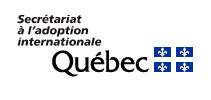Challenges and Preparation for Adoption
Adopting a child from another country is a life plan that requires important adjustments within the family.
Children who are proposed for international adoption have a life story and a history of abandonment. In addition to any specific needs they may have, they face significant challenges adapting, both physically and emotionally, when integrating into a new family.
The challenges related to a child's integration are also experienced by the person who wants to adopt a child domiciled outside Québec. This person must be ready to accept the child as he or she is and must understand the reality surrounding the situation of children proposed for adoption. Thus, it is very important to prepare people who want to adopt a child domiciled outside Québec.
The majority of countries recognize the importance of this preparation. More and more countries of origin require that the person who wants to adopt participate in adoption preparation workshops which deal with the challenges of international adoption.
Consequently, to prepare the person who want to adopt a child domiciled outside Québec, Québec has implemented a mandatory prior training called International Adoption: First Steps and Thoughts ![]() (available in French and English).
(available in French and English).
Deciding to adopt also means accepting that you may encounter obstacles over which you will have no control, that may hinder the adoption, or even prevent the adoption from proceeding. Obstacles may include disruptions within the country of origin, such as civil or political instability, natural disaster, and changes in adoption rules, requirements, or the legislative framework.
Training prior to adopting a child domiciled outside Québec
International Adoption: First Steps and Thoughts prior training for people who want to adopt a child domiciled outside Québec. It is designed for people interested in intercountry adoptions and serves to inform and make them aware of the realities of the process, as well as support them in their decision on whether to move forward with such a life plan.
Since August 10, 2023, this prior training will become mandatory with the Regulation respecting training prior to adopting a child domiciled outside Québec (currently available in French only) for all persons domiciled in Québec considering international adoption.
Topics covered include:
- Reasons behind the desire to adopt a child
- The experiences of adopted children as well as myths about adoptive parenthood
- The socio-emotional development of the child, pre-adoption risk factors, and protective factors
- Different aspects of the overall health of an adopted child
- The situation of children around the world and the laws governing international adoption
- The pre-adoption experience of a child and their quest for identity as an adopted person
- International adoption as experienced by adoptive parents
- The process of an international adoption project
- Deciding whether to proceed with an international adoption project
Delivered entirely online, the training is designed so that participants can complete it independently, at their own pace, and according to their schedule.
Visit the training website ![]() for more information and to register.
for more information and to register.
Adoption preparation workshops
Preparatory workshops for international adoption are offered by professionals, such as social workers and psychoeducators. The topics dealt with may include:
- differences between the adopted child and the biological child;
- health and development of the adopted child;
- trauma;
- grief;
- feelings of abandonment;
- the adoptive triangle (biological parents ─ adoptive parents ─ adopted child);
- attachment;
- discipline;
- culture;
- other factors related to successful adoption.
Establishments that offer adoption preparation workshops
Two establishments in the health and social services network offer online pre-adoption workshops:
Centre intégré universitaire de santé et de services sociaux du Centre-Sud-de-l'Île-de-Montréal
Centre de protection de l’enfance et de la jeunesse Maisonneuve Est
1001, boulevard de Maisonneuve Est
Montréal (Qc) H2L 4P9
Phone: 514 896-3150
Email: adoption.internationale.ccsmtl@ssss.gouv.qc.ca
Web site: Adoption section of the Centre intégré universitaire de santé et de services sociaux du Centre-Sud-de-l'Île-de-Montréal website (in French only) ![]()
Centre intégré universitaire de santé et de services sociaux de l'Ouest-de-l'Île-de-Montréal
Centres de la jeunesse et de la famille Batshaw
6, rue Weredale Park
Westmount (Qc) H3Z 1Y6
Phone: 514 989-1885, poste 1142
Email: adoption.retrouvailles.batshaw.comtl@ssss.gouv.qc.ca
Web site: International adoption section of the Centre intégré universitaire de santé et de services sociaux de l'Ouest-de-l'Île-de-Montréal website ![]()
This establishment offers workshops in English.
Adoption preparation workshops offered by certified bodies
Certified bodies offer various activities, ranging from individual interviews to structured preparation workshops for international adoption.
These workshops touch on the issues, challenges and particularities of international adoption in the country where the body has programs. Adoptive parents sometimes share their experiences during workshops.
As well, some certified bodies organize conferences and seminars given by professionals with experience in the field of international adoption. For example, invited speakers may be social workers, psychologists and nurse specialists.
